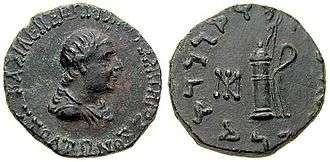Agathokleia
- For the 3rd century BC mistress of Ptolemy IV Philopator, see Agathoclea.
| Agathokleia | |
|---|---|
| Indo-Greek queen | |
|
Portrait of Agathokleia. | |
| Reign | 110–100 BCE |
| Successor | Strato I |
| Born | Gandhara |
| Died | Gandhara or Punjab |
| Burial | Stupas in Gandhara |
| Spouse | Menander I or Nicias |
| Issue | Strato I |


Obv: Queen Agathokleia in profile.
Rev:: Greek straight bow and arrow container.

Agathokleia Theotropos (Greek: Ἀγαθόκλεια Θεότροπος; the epithet possibly means the Goddess-like) was an Indo-Greek queen who ruled in parts of northern India in the 2nd-century BC as regent for her son Strato I.
Date and genealogy
The traditional view, introduced by Tarn and defended as late as 1998 by Bopearachchi, is that Agathokleia was the widow of Menander I. In the civil wars after Menander's death, the Indo-Greek empire was divided, with Agathokleia and her young son Strato maintaining themselves in the eastern territories of Gandhara and Punjab.

The modern view, embraced by R. C. Senior and probably more solid since it is founded on numismatical analyses, suggests that Agathokleia was a later queen, perhaps ruling from 110 BC–100 BC or slightly later. In this case, Agathokleia was likely the widow of another king, possibly Nicias or Theophilus. In either case, Agathokleia was among the first women to rule a Hellenistic Kingdom, in the period following the reign of Alexander the Great.
Some of her subjects may have been reluctant to accept an infant king with a queen regent: unlike the Seleucid and Ptolemaic Kingdoms, almost all Indo-Greek rulers were depicted as grown men. This was probably because the kings were required to command armies, as can be seen on their coins where they are often depicted with helmets and spears. Agathokleia seems to have associated herself with Athena, the goddess of war. Athena was also the dynastic deity of the family of Menander, and Agathokleia's prominent position suggests that she was herself the daughter of a king, though she was probably too late to have been a daughter of the Bactrian king Agathocles.
Coinage

Obv: Conjugate busts of Strato and Agathokleia. Greek legend: BASILEOS SOTEROS STRATONOS KAI AGATOKLEIAS "Of Saviour King Strato, and Agathokleia".
Rev: Athena throwing thunderbolt. Kharoshthi legend: MAHARAJASA TRATASARA DHARMIKASA STRATASA "King Strato, Saviour and Just (="of the Dharma")".
The coins of Agathokleia and Strato were all bilingual, and Agathokleia's name appears more often in the Greek legend than in the Indian.
(See Strato I for details of legends.)
Most of Agathokleia's coins were struck jointly with her son Strato, though on their first issues, he is not featured on the portrait.
Silver: Bust of Agathokleia/walking king
Bust of Strato and Agathokleia conjoined/Athena Alkidemos
Bronzes: Bust of either helmeted Athena or Agathokleia as a personification of this goddess/sitting Herakles
The later king Heliokles II overstruck some of Agathokleia's coins.
See also
Sources
- W. W. Tarn. The Greeks in Bactria and India. Third Edition. Cambridge: University Press, 1966.
External links
| Preceded by Menander I |
Indo-Greek ruler in Gandhara and Punjab | Succeeded by Strato I |
- ↑ O. Bopearachchi, "Monnaies gréco-bactriennes et indo-grecques, Catalogue raisonné", Bibliothèque Nationale, Paris, 1991, p.453
- ↑ History of Early Stone Sculpture at Mathura: Ca. 150 BCE - 100 CE, Sonya Rhie Quintanilla, BRILL, 2007, p.9
